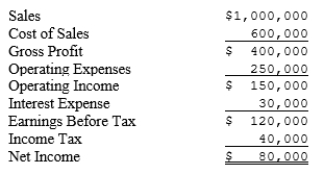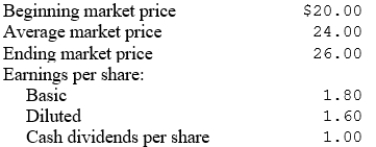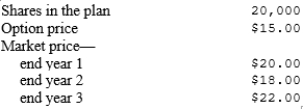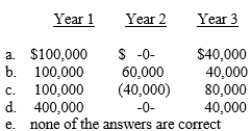Deck 9: For the Investor
Question
Question
Question
Question
Question
Question
Question
Question
Question
Question
Question
Question
Question
Question
Question
Question
Question
Question
Question
Question
Question
Question
Question
Question
Question
Question
Question
Question
Question
Question
Question
Question
Question
Question
Question
Question
Question
Question
Question
Question
Question
Question

Unlock Deck
Sign up to unlock the cards in this deck!
Unlock Deck
Unlock Deck
1/42
Play
Full screen (f)
Deck 9: For the Investor
1
Using financial leverage is a good financial strategy from the viewpoint of stockholders of companies having:
A) a high debt ratio
B) cyclical highs and lows
C) steady or rising profits
D) a steadily declining current ratio
E) none of the answers are correct
A) a high debt ratio
B) cyclical highs and lows
C) steady or rising profits
D) a steadily declining current ratio
E) none of the answers are correct
C
2
Which of the following is not a reason to interpret book value with caution?
A) Land may be worth more than it cost.
B) Depreciable assets may be held.
C) Investments may be worth more than their purchase price.
D) Patents may have a high market value.
E) All of the answers are correct.
A) Land may be worth more than it cost.
B) Depreciable assets may be held.
C) Investments may be worth more than their purchase price.
D) Patents may have a high market value.
E) All of the answers are correct.
E
3
The percentage of earnings retained is computed by dividing retained earnings by total stockholders' equity.
False
4
A summarized income statement for Leveraged Inc.is presented below.  The degree of financial leverage is:
The degree of financial leverage is:
A) $150,000/$30,000
B) $150,000/$120,000
C) $1,000,000/$400,000
D) $150,000/$80,000
E) $400,000/$120,000
 The degree of financial leverage is:
The degree of financial leverage is:A) $150,000/$30,000
B) $150,000/$120,000
C) $1,000,000/$400,000
D) $150,000/$80,000
E) $400,000/$120,000

Unlock Deck
Unlock for access to all 42 flashcards in this deck.
Unlock Deck
k this deck
5
The earnings per share is computed for:
A) common stock
B) non-redeemable preferred
C) redeemable preferred
D) common stock and non-redeemable preferred stock
E) common stock and fully diluted preferred stock
A) common stock
B) non-redeemable preferred
C) redeemable preferred
D) common stock and non-redeemable preferred stock
E) common stock and fully diluted preferred stock

Unlock Deck
Unlock for access to all 42 flashcards in this deck.
Unlock Deck
k this deck
6
The ratio percentage of earnings retained is the same as that termed:
A) dividend yield
B) dividend payout
C) this year's retained earnings to net income
D) return on common equity
E) book value
A) dividend yield
B) dividend payout
C) this year's retained earnings to net income
D) return on common equity
E) book value

Unlock Deck
Unlock for access to all 42 flashcards in this deck.
Unlock Deck
k this deck
7
Dawn Alive reported the following for 2010.  The price/earnings ratio and dividend payout were:
The price/earnings ratio and dividend payout were:
A) 19.59 and 52.88%
B) 16.30 and 52.88%
C) 16.30 and 44.00%
D) 19.59 and 44.00%
E) 37.04 and 52.88%
 The price/earnings ratio and dividend payout were:
The price/earnings ratio and dividend payout were:A) 19.59 and 52.88%
B) 16.30 and 52.88%
C) 16.30 and 44.00%
D) 19.59 and 44.00%
E) 37.04 and 52.88%

Unlock Deck
Unlock for access to all 42 flashcards in this deck.
Unlock Deck
k this deck
8
A firm has a degree of financial leverage of 1.20.If earnings before interest and tax increase by 20%, then net income:
A) will not necessarily change
B) will increase by 20%
C) will decrease by 24%
D) will decrease by 20%
E) none of the answers are correct
A) will not necessarily change
B) will increase by 20%
C) will decrease by 24%
D) will decrease by 20%
E) none of the answers are correct

Unlock Deck
Unlock for access to all 42 flashcards in this deck.
Unlock Deck
k this deck
9
Which of the following ratios usually reflects investors opinions of the future prospects for the firm?
A) dividend yield
B) book value per share
C) price/earnings ratio
D) earnings per share
E) dividend payout
A) dividend yield
B) book value per share
C) price/earnings ratio
D) earnings per share
E) dividend payout

Unlock Deck
Unlock for access to all 42 flashcards in this deck.
Unlock Deck
k this deck
10
Interest expense creates magnification of earnings through financial leverage because:
A) the interest rate is variable
B) interest accompanies debt financing
C) the use of interest causes higher earnings
D) interest costs are cheaper than the required rate of return to equity owners
E) while earnings available to pay interest rise, earnings to residual owners rise faster
A) the interest rate is variable
B) interest accompanies debt financing
C) the use of interest causes higher earnings
D) interest costs are cheaper than the required rate of return to equity owners
E) while earnings available to pay interest rise, earnings to residual owners rise faster

Unlock Deck
Unlock for access to all 42 flashcards in this deck.
Unlock Deck
k this deck
11
Which of the following is not a true statement regarding stock options?
A) They may cause dilution of earnings per share.
B) They generally allow the purchase of common stock at favorable terms.
C) They involve a compensation expense.
D) Exercise improves the short-term liquidity and debt position of the issuing firm.
E) The potential dilution can be disregarded in financial analysis.
A) They may cause dilution of earnings per share.
B) They generally allow the purchase of common stock at favorable terms.
C) They involve a compensation expense.
D) Exercise improves the short-term liquidity and debt position of the issuing firm.
E) The potential dilution can be disregarded in financial analysis.

Unlock Deck
Unlock for access to all 42 flashcards in this deck.
Unlock Deck
k this deck
12
The following data were gathered from the annual report of Desk Products.  The book value per share is:
The book value per share is:
A) $30.00
B) $15.00
C) $14.00
D) $13.75
E) none of the answers are correct
 The book value per share is:
The book value per share is:A) $30.00
B) $15.00
C) $14.00
D) $13.75
E) none of the answers are correct

Unlock Deck
Unlock for access to all 42 flashcards in this deck.
Unlock Deck
k this deck
13
The best dividend payout ratio:
A) approximates 50%
B) continues at the same level as was historically paid
C) is similar to the industry average
D) is higher than that of competitors
E) does not follow any rule of thumb for dividend payout
A) approximates 50%
B) continues at the same level as was historically paid
C) is similar to the industry average
D) is higher than that of competitors
E) does not follow any rule of thumb for dividend payout

Unlock Deck
Unlock for access to all 42 flashcards in this deck.
Unlock Deck
k this deck
14
Smith reported the following for 2010.  The price earnings ratio and dividend payout were:
The price earnings ratio and dividend payout were:
A) 16.25 and 62.50%
B) 16.25 and 65.00%
C) 17.00 and 62.50%
D) 15.00 and 62.50%
E) 15.00 and 60.00%
 The price earnings ratio and dividend payout were:
The price earnings ratio and dividend payout were:A) 16.25 and 62.50%
B) 16.25 and 65.00%
C) 17.00 and 62.50%
D) 15.00 and 62.50%
E) 15.00 and 60.00%

Unlock Deck
Unlock for access to all 42 flashcards in this deck.
Unlock Deck
k this deck
15
Which of the following ratios represents dividends per common share in relation to market price per common share?
A) dividend payout
B) dividend yield
C) price/earnings
D) book value per share
E) percentage of earnings retained
A) dividend payout
B) dividend yield
C) price/earnings
D) book value per share
E) percentage of earnings retained

Unlock Deck
Unlock for access to all 42 flashcards in this deck.
Unlock Deck
k this deck
16
The price/earnings ratio:
A) measures the past earning ability of the firm
B) is a gauge of future earning power as seen by investors
C) relates price to dividends
D) relates price to total net income
E) all of the answers are correct
A) measures the past earning ability of the firm
B) is a gauge of future earning power as seen by investors
C) relates price to dividends
D) relates price to total net income
E) all of the answers are correct

Unlock Deck
Unlock for access to all 42 flashcards in this deck.
Unlock Deck
k this deck
17
Book value per share may not approximate market value per share because:
A) the book value is after tax
B) book values are based on replacement costs rather than market values
C) book value is related to book figures and market value is related to the future potential as seen by investors
D) investors do not understand book value
E) book value is not related to dividends
A) the book value is after tax
B) book values are based on replacement costs rather than market values
C) book value is related to book figures and market value is related to the future potential as seen by investors
D) investors do not understand book value
E) book value is not related to dividends

Unlock Deck
Unlock for access to all 42 flashcards in this deck.
Unlock Deck
k this deck
18
What is the effect of the exercise of stock options?
A) They generate cash to the issuing firm and therefore increase profit per share.
B) They are an expense at the time of exercise.This lowers net income.
C) They increase debt and lower borrowing capacity but have no effect on profit.
D) They increase the number of shares outstanding.
E) They have no immediate effect on profitability.
A) They generate cash to the issuing firm and therefore increase profit per share.
B) They are an expense at the time of exercise.This lowers net income.
C) They increase debt and lower borrowing capacity but have no effect on profit.
D) They increase the number of shares outstanding.
E) They have no immediate effect on profitability.

Unlock Deck
Unlock for access to all 42 flashcards in this deck.
Unlock Deck
k this deck
19
Good Boss Inc.had the following pattern of results related to stock appreciation rights.  The compensation expense would be:
The compensation expense would be: 
 The compensation expense would be:
The compensation expense would be: 

Unlock Deck
Unlock for access to all 42 flashcards in this deck.
Unlock Deck
k this deck
20
Stable dividend policy would most commonly imply:
A) a high price/earnings ratio
B) a stable dividend yield
C) stable dividends per share
D) stable earnings per share
E) increasing dividends per share
A) a high price/earnings ratio
B) a stable dividend yield
C) stable dividends per share
D) stable earnings per share
E) increasing dividends per share

Unlock Deck
Unlock for access to all 42 flashcards in this deck.
Unlock Deck
k this deck
21
In general, new firms, growing firms, and firms perceived as growth firms will have a relatively low percentage of earnings retained.

Unlock Deck
Unlock for access to all 42 flashcards in this deck.
Unlock Deck
k this deck
22
A disadvantage of interest expense over dividends is its tax deductibility.

Unlock Deck
Unlock for access to all 42 flashcards in this deck.
Unlock Deck
k this deck
23
Total earnings from securities include both dividends and price appreciation.

Unlock Deck
Unlock for access to all 42 flashcards in this deck.
Unlock Deck
k this deck
24
When a stock split occurs, earnings per share must be adjusted retroactively.

Unlock Deck
Unlock for access to all 42 flashcards in this deck.
Unlock Deck
k this deck
25
A firm might have a low dividend payout ratio if it were planning a major expansion.

Unlock Deck
Unlock for access to all 42 flashcards in this deck.
Unlock Deck
k this deck
26
Book value per share measures the current value of the net assets on a per share basis.

Unlock Deck
Unlock for access to all 42 flashcards in this deck.
Unlock Deck
k this deck
27
If financial leverage is used, a rise in EBIT will cause a lessor rise in net income.

Unlock Deck
Unlock for access to all 42 flashcards in this deck.
Unlock Deck
k this deck
28
The price/earnings ratio expresses the relationship between selling prices of the company's products and the related earnings.

Unlock Deck
Unlock for access to all 42 flashcards in this deck.
Unlock Deck
k this deck
29
Nonrecurring items such as extraordinary income and disposal of a segment require separate earnings per share disclosure.

Unlock Deck
Unlock for access to all 42 flashcards in this deck.
Unlock Deck
k this deck
30
Using financial leverage results in a fixed change that can materially affect the earnings available to the common shareholders.

Unlock Deck
Unlock for access to all 42 flashcards in this deck.
Unlock Deck
k this deck
31
The use of financing with a fixed charge (such as interest) is termed financial leverage.

Unlock Deck
Unlock for access to all 42 flashcards in this deck.
Unlock Deck
k this deck
32
Some employees prefer restricted stock over options because they receive actual shares of stock.

Unlock Deck
Unlock for access to all 42 flashcards in this deck.
Unlock Deck
k this deck
33
When market value is below book value, this relationship indicates that the investors view the company as having strong future potential.

Unlock Deck
Unlock for access to all 42 flashcards in this deck.
Unlock Deck
k this deck
34
Operating leverage refers to the existence of fixed operating costs.

Unlock Deck
Unlock for access to all 42 flashcards in this deck.
Unlock Deck
k this deck
35
The degree of financial leverage is the multiplication factor by which debt to equity changes as new debt is issued.

Unlock Deck
Unlock for access to all 42 flashcards in this deck.
Unlock Deck
k this deck
36
The use of debt financing creates financial leverage.

Unlock Deck
Unlock for access to all 42 flashcards in this deck.
Unlock Deck
k this deck
37
Stock appreciation rights can have a material impact on reported earnings.

Unlock Deck
Unlock for access to all 42 flashcards in this deck.
Unlock Deck
k this deck
38
Stock appreciation rights give the employee compensation at a future date, based on the market price at the date of exercise in excess of a pre-established dollar market.

Unlock Deck
Unlock for access to all 42 flashcards in this deck.
Unlock Deck
k this deck
39
Dividend yield relates dividends per share to market price per share.

Unlock Deck
Unlock for access to all 42 flashcards in this deck.
Unlock Deck
k this deck
40
In computing earnings per share, preferred dividends are subtracted from net income.

Unlock Deck
Unlock for access to all 42 flashcards in this deck.
Unlock Deck
k this deck
41
SFAS No.123(R) results in greater international comparability in the accounting for share-based transactions.

Unlock Deck
Unlock for access to all 42 flashcards in this deck.
Unlock Deck
k this deck
42
Stock options do not require a cash outlay from the company, while stock appreciation rights often do require a cash outlay.

Unlock Deck
Unlock for access to all 42 flashcards in this deck.
Unlock Deck
k this deck



